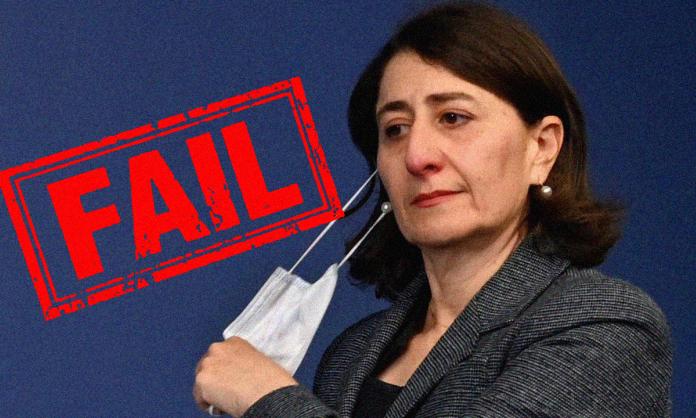Gladys Berejiklian has resigned as New South Wales premier due to an escalating Independent Commission Against Corruption (ICAC) investigation into allegations of misconduct against her. Her downfall should be welcomed.
Berejiklian is the third Liberal premier to be brought down by an ICAC investigation in New South Wales, following Nick Greiner in 1992 (who hilariously enough set up ICAC) and Barry O’Farrell in 2014. Liberal premier Mike Baird also resigned in 2017 over a corruption scandal connected to Crown Casino.
It is telling though that what ended Berejiklian’s political career was not her disastrous handling of the pandemic. Berejiklian is the individual most responsible not only for the more than 400 deaths in New South Wales since the beginning of the pandemic, but for COVID-19 getting out of control in the two most populous states in the country. All the effort ordinary people put into keeping COVID-19 out, including complying with long lockdowns and other health measures, was thrown away by Berejiklian who was famously more concerned about keeping Bunnings open than saving lives.
The disasters started early. In March 2020, the Berejiklian government allowed 2,650 passengers to disembark the Ruby Princess cruise ship in Sydney without being tested for COVID-19, despite known cases being on board. At least 900 people were infected as a result, and 28 died.
New South Wales had a good run for a while, but faced a major test in June this year. The Delta outbreak gave the Berejiklian government the chance to demonstrate the superiority of its business-first approach to containing COVID-19, and now the nearly 15 million people who live in New South Wales and Victoria face the daily prospect of being exposed to or infected with the virus.
The Berejiklian government delayed introducing health restrictions, even after a Delta super-spreader event was identified in the eastern suburbs of Sydney. Berejiklian went on to resist calls for weeks to tighten the restrictions as the virus spread throughout the city and then seeped into the rest of the state, including Indigenous communities in the state’s west. This was after months of campaigning by Berejiklian against lockdowns and other health measures.
In her resignation speech, Berejiklian thanked frontline staff. But just before the most recent outbreak of the pandemic, she tried to freeze wages for nurses, leading to hospital strikes. Throughout the pandemic, she has downplayed the serious crisis facing the health sector. Three days before her resignation, another group of essential workers—train drivers— went on strike against the government’s pitiful offer of a 0.3 percent pay increase.
During her time in office, Berejiklian consistently put the interests of big business ahead of people’s health. Unsurprisingly, she was championed by the corporate world. The Australian Financial Review published its notorious “The Woman Who Save Australia” front cover in April, just two months before the virus started spreading out of control under her watch. Hilariously enough, the Australian Financial Review published another front page, this time with the headline “POWER” accompanied by a picture of Berejiklian, only a few hours before she announced her resignation.
During her final weeks as premier, Berejiklian campaigned hard for a rapid ending of health restrictions, including a snap decision to bring forward the opening of schools to 18 October. She has failed to provide the necessary support to the already strained health system that is now facing the relaxing of restrictions, despite the fact that there are already 1055 people hospitalised due to COVID-19, including 210 in intensive care and 104 requiring a ventilator.
It is good Gladys is gone, but her replacement will be just as bad, if not considerably worse. So far, current treasurer Dominic Perrottet and Rob Stokes, the minister for Planning and Public Space, have thrown their hats in the ring.
Perrottet started in politics as an anti-student union campaigner at Sydney University during the battle over Voluntary Student Unionism. His first run as a MP was backed by David Clarke, the notorious leader of the right-wing “Taliban” faction of the state Liberal party, and he is currently the leader of the conservative faction. When Donald Trump was elected in 2016, Perrottet hailed the result on his official Facebook page, stating that “it’s time for a conservative spring”. During the COVID-19 crisis, Perrottet consistently attacked Berejiklian from the right. At a crisis cabinet meeting in July, Perrottet was the only member to vote against an extension of the lockdown and has constantly pushed since then to end restrictions as soon as possible. The other main contender, Rob Stokes, is from Berejiklian’s own moderate faction.
As restrictions in New South Wales come to an end, we are entering an uncertain and potentially dangerous period. Whoever becomes the next premier, the fight to put health before profits will have to continue.









